 |
 |
|
|||||||||||||||||||||||||
|
| <<Back |
| Cross-Department Education Project |
|
 Fig.1 Final Accomplishment Report Meeting  Fig.2 Student Participant Details As a vision of cross-department doctoral program education, this department aims to develop people with well-established fundamental education and high level technical knowledge, as well as with a sense of responsibility and mission with creative ability, a pioneering force for unexplored fields, an international view, project planning, and management ability. One of the three pillars of the doctoral program education is Mechanical Systems Innovation I which is held as a cross-department PBL lecture. With Nobuhide Kasagi as a program leader, although 1. fundamental education, 2. technical knowledge, 3. literacy, and 4. competency are given as abilities which must be cultivated by graduate school education, of these abilities, the primary aim in this education project is to cultivate competency. Old doctorate graduates in industry often have been criticized because although they are good at delving deeper into particular specialized areas, their research is too "sectional." In response to this, with the recognition that it is important to bring doctorate graduates, as human resources, not only into academic fields such as colleges and national research organizations into industry, as well as holding the cross-department lecture, the Council for Human Resource Development Meeting was also established for information exchange with industry. From industry, doctorate graduates were strongly sought for the granting of an overlook view, power of teamwork, and the improvement of research management ability, so these were set as one of the key challenges of the cross-department lecture. This lecture is held for one year. Projects are set as lecture activities, and after students are placed in each project group, lectures and exercises are carried out. In each group the future technology research development topics are set in the introductory lectures, that is to say deepen the debate concerning the meaning of this technology in society, the research development roadmap, market introduction process, etc. An accomplishment report meeting is held as a conclusion, and presentations are made by students in English and by poster sessions. The final accomplishment report meeting is shown in Fig.1. With the student participant accomplishment reports, related teachers and participants from industry take part and have a lively debate. Fig. 2 shows the number of participants over the four years that participated in the lecture and the details of the majors. Like this, this lecture was performed with the participation of students of fields with a wide scope of related majors. With the purpose of surveying the evaluations from student participants, a questionnaire was given two times, at the middle and after the end of the lecture course. The result was that 90% of students answered, "I understand the meaning of the course." In addition, high evaluations were received from industry such as "the importance of the study of project management among several fields," and, "a valuable opportunity to study the targeting process by focusing on the theme." This type of lecture form goes beyond the scopes of traditional college education. Therefore, it is important to accumulate the methodology to cultivate the power of teamwork and project management ability from acquired experience in this trial. Moreover, to develop these abilities by the cooperation of such as business project management specialists are thought to be important. |
| <<Back | Page top |
 Shinsuke Sakai: Department of Mechanical Engineering
Shinsuke Sakai: Department of Mechanical Engineering